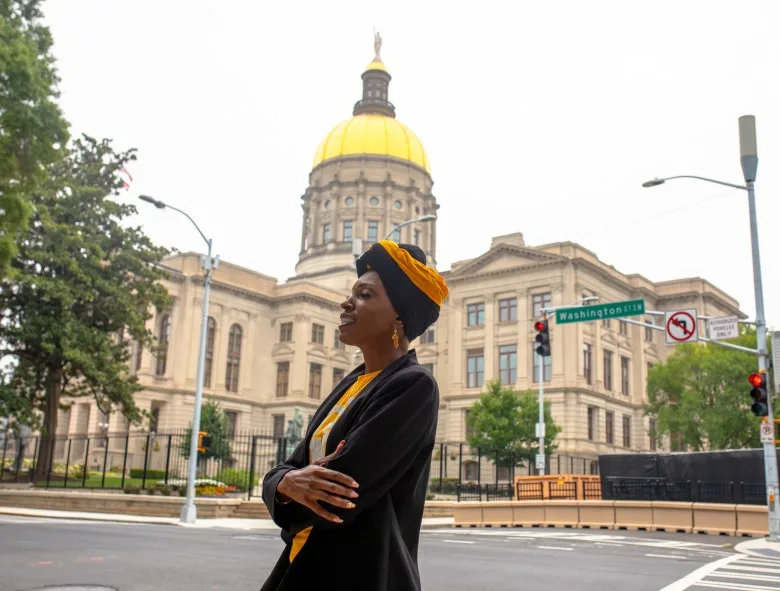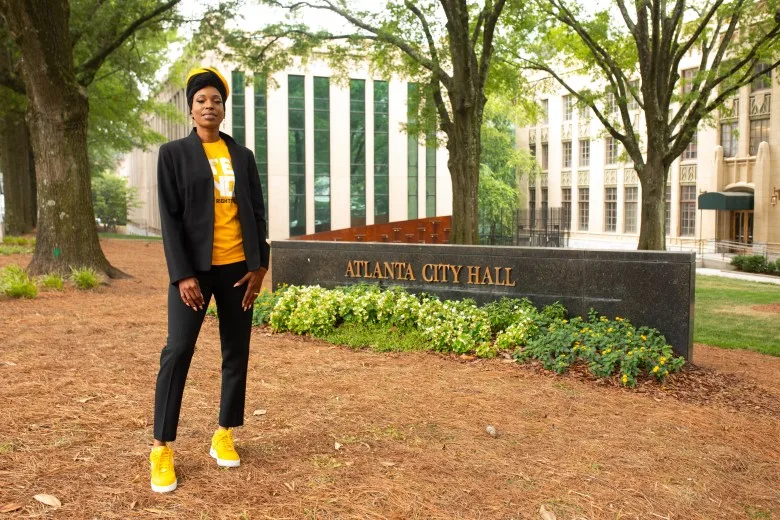The Inner City Muslim-Action Network (IMAN, pronounced ee-MAN) actively strives toward meaningful social justice and human dignity beyond the barriers of religion, ethnicity and nationality. To that end, IMAN is fighting for the restoration of voting rights to formerly incarcerated felons that have paid their debts to society.
Kareemah Hanifa is the Lead Community Organizer with IMAN Atlanta and she is leading the fight for the full and complete restoration of voting rights for formerly incarcerated felons that have served their time in Georgia.
“I think in the system that we’re living in right now the criminal justice system doesn’t just affect Brown and Black people,” said Hanifa. “We are all people who breathe and eat and need access to resources. This [initiative] empowers people of color from marginalized communities, it’s who it affects, right? Because the people who create these laws don’t fully understand how these laws just empower people in the community. They don’t understand when people don’t have access to resources that crime rates go up. They don’t understand these things.”
Currently in the State of Georgia, persons with felonies on their records can vote only if any of these conditions are met, according to the Secretary of State’s office:
- You are not currently serving a sentence for a felony conviction.
- You are “off paper”— you completed incarceration, parole, and probation.
- You are serving a felony First Offender or Conditional Discharge sentence and the status has not been revoked.
- Your sentence is complete — your right to vote is automatically restored. You just need to re-register in order to vote.
Georgia’s Black citizens are significantly more likely to be disenfranchised than non-Black citizens, with 5.2% of Georgia’s Black voting age population currently denied the vote.

Hanifa previously met with Senator Warnock regarding the reinstatement of voting rights to the formerly incarcerated people. He understood the disenfranchisement and the unfairness of these laws, particularly in the Southern United States. Hanifa added that Warnock understood the plight because he has a member that was incarcerated and released during the throes of the Coronavirus outbreak.
“He had the understanding that there are these barriers that prevent people from fully reintegrating back into the community,” explained Hanifa. “And so what IMAN Atlanta is doing is talking with state representatives, talking with Senators about why this is a very archaic law. Why this law is unfair and why these laws do not meet the needs of the people who live in America today.”
Over the last 25 years, belief in these principles has motivated 25 states to change their laws and practices to expand voting access to people with felony convictions. Despite these important reforms, 4.6 million Americans were unable to vote in the 2020 election because of their criminal record, according to John Paul Taylor, Senior Campaign Strategy Associate, Rights Restoration with the Advancement Project. Fifty percent of those individuals reside in four states: Alabama, Georgia, Louisiana, and Mississippi.
“There was a time in a community where maybe there was one or two people who had been incarcerated,” said Hanifa. “Now everyone knows someone who has been incarcerated, right? It’s not a whisper anymore. It is a welcome home at the recreational center. It is a welcome home at the church services. So today we understand that there are more people of color who have very long sentences of probation and parole.”

Hanifa believes voter disenfranchisement is something that affects individuals and communities and would provide a bi-partisan solution. She also added that if a person’s voting rights are restored, one can’t assume that person is going to vote Democratic or they’re going to vote Republican. She believes whoever is in favor of serving the community in the capacity in which the community needs, that person will ultimately come out on top.
“As we train up people, we’re not only just saying ‘hey, you need to change the law,’ but actually giving people information,” said Taylor. “We want people that can also truly be that watchdog and monitor of the system for once the process has, you know, once we change the law and those that are directly impacted, like Kareemah, can actually hold the state accountable.”
Hanifa and Taylor want everyone to know is restoring voting rights to those that were incarcerated goes hand in hand with rectifying racial and societal injustices because the people willing to participate not only have a unique perspective
“I always tell people, like don’t vote for people because they look like you,” explained Hanifa. “Don’t vote for people simply because they sound like you or they talk like you. Because, people say a whole lot of things. But do you support [voter] rights restoration? Do you support access to clean water, affordable housing, and the environment? Are you a supporter of environmental justice? Like are these the things that you believe in and if you do, then you got everybody’s vote?”
Note: Anyone convicted of a misdemeanor in Georgia still has the right to vote. If a person is incarcerated for a misdemeanor, that person can request an absentee ballot. Plus, anyone can vote while awaiting trial for any charge, even while incarcerated, as long as the person has not lost their right to vote due to a prior conviction.

